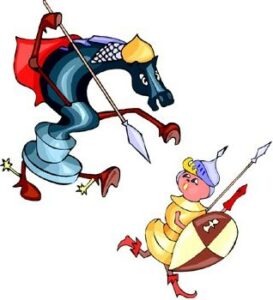LESSON 1.22
What Are Pronouns?
 A pronoun is a word that can take the place of a noun.
A pronoun is a word that can take the place of a noun.
Noun: Sally loves skydiving.
Pronoun: She loves skydiving.
Class Activity
Listen to how strange language would sound if we did not have pronouns.
Sally and Sam went to the store. Sally and Sam wanted to buy a baseball cap for their brother, Billy. Billy loved playing baseball. Sally and Sam wanted Billy to do well playing baseball this year. Billy was a pitcher. A pitcher throws the ball. Sally and Sam like watching Billy play. Billy had been playing baseball for three years. Billy wanted to be a professional baseball player when Billy grew up. Billy was proud of Billy whenever Billy had a good game.
Pronouns and the Noun Test
A pronoun does not pass the noun test. We cannot say:
The she The I
The person named she The person named I
The everyone The people named everyone
The Pronoun Test
Memorize this: Sally can fool Sam?
To test to see if a word is a pronoun, try to substitute it for Sally or Sam. If the word fits, and you have not identified it as a noun, then it is a pronoun.
Nouns: Kendra can fool Branson?
Pronouns: She can fool everyone?
I can fool him?
The test ends with a question mark. That is because some pronouns involve questions.
Nouns: Sally can fool Sam?
Pronouns: Which [one] can fool him?
Who can fool Sam?
Whoever can fool Sam?
Pronouns That Don’t Pass the Test
Pronouns that end in self or selves only fit the test if the same person is at the beginning:
Pronouns: Sally can fool herself?
I can fool myself?
Each other and one another do not pass the pronoun test but are considered pronouns.
Also, other is considered a pronoun even though it passes the noun test: the other.
Don’t Be Fooled!
Some words that look like pronouns are not really pronouns:
Pronouns: Sally can fool you? Not pronouns: Sally can fool your?
You can fool Sam? Your can fool Sam?
Sally can fool ours? Sally can fool our?
Sally can fool him? Sally can fool his?
Class Activity
Determine which of the following are pronouns, which are nouns, and which are neither. Do not bother identifying the part of speech for “neither” words.
1. desk | 6. them | 11. their | 16. herself |
2. homework | 7. yes | 12. who | 17. spider |
3. me | 8. my | 13. stapler | 18. ourselves |
4. something | 9. her | 14. it | 19. you |
5. Jacob | 10. anybody | 15. what | 20. she |
Individual Activity
Underline the eight pronouns in the following. Some are repeated. The sentences are numbered for teaching purposes.
(1) The airplane, invented by the Wright brothers in 1903, was a full eight years old before the first daredevil took a chance on leaving it in a parachute. (2) He was Grant Morton, a stunt man entertaining a seaside crowd at Venice, California. (3) The jump was haphazard. (4) Everyone watched in disbelief as he climbed out on the wing of a plane, holding a folded parachute. (5) Then, throwing it to the wind like a sheet, he let it pull him off into space. |
Individual or Small Group Activity
Complete the exercise: Austria